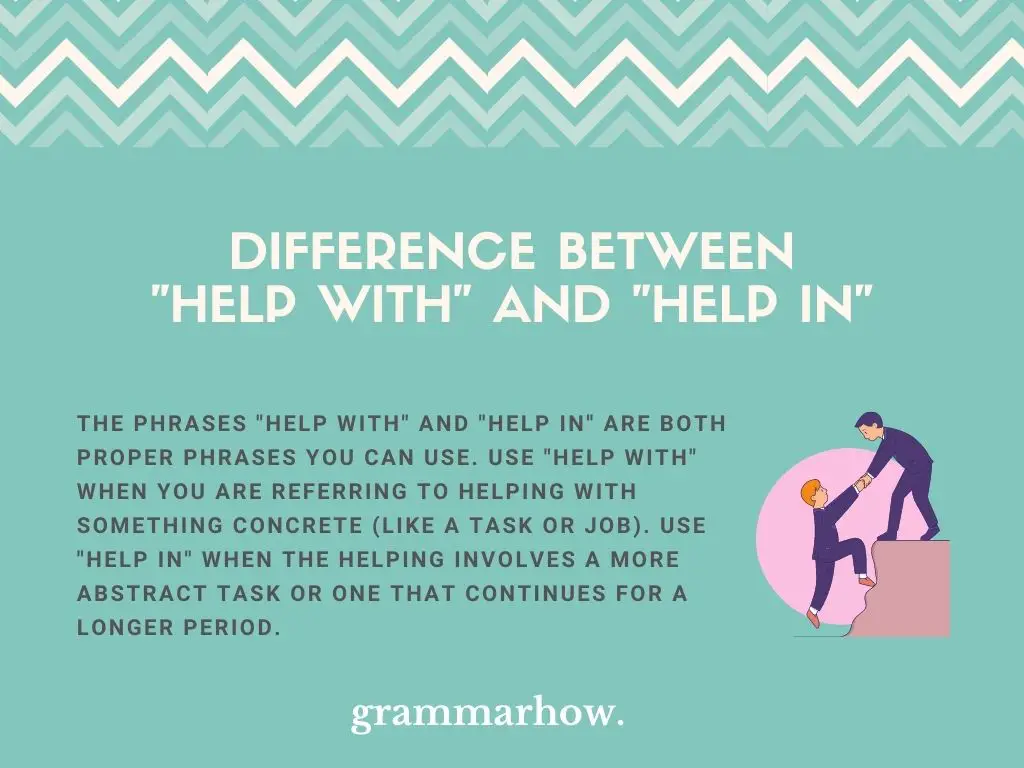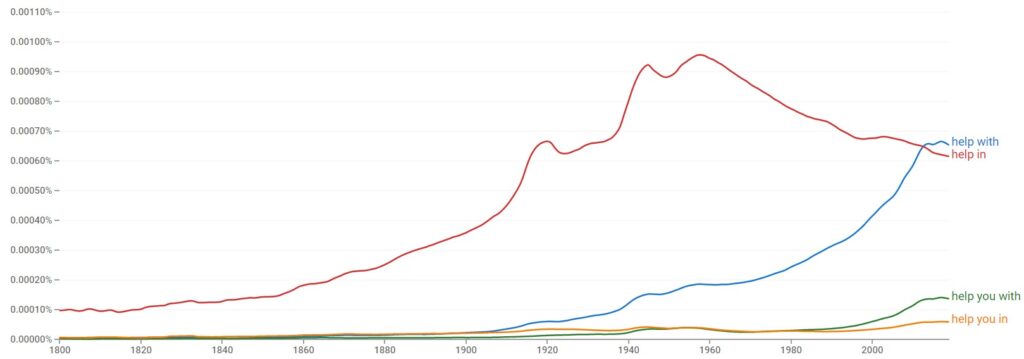The phrases “help with” and “help in” are each a way to express the concept of one person helping another individual with a task, job, or other activity. But are they interchangeable? Here you will learn the meaning of both phrases and how to best use each in a sentence.
What Is The Difference Between “Help With” And “Help In”?
The phrases “help with” and “help in” are both proper phrases you can use. Use “help with” when you are referring to helping with something concrete (like a task or job). Use “help in” when the helping involves a more abstract task or one that continues for a longer period.

To clarify further, the main difference between the two phrases has to do with the specific thing that the individual needs or is offering “help with” or “help in.” The preposition “in” suggests a part of an activity, whereas the preposition “with” suggests a specific thing that requires help.
What Does “Help With” Mean?
The phrase “help with” means that a person is helping another person complete a task or job that is a one-time or limited-time occurrence. After the person has helped, the task is completed. It is primarily used with tangible tasks that have a real beginning and end.
These example sentences demonstrate what is meant by a tangible task that has a definite beginning and end.
- I need your help with picking up the toys before the guests come over.
- Can you help with setting the table while I make dinner?
- I need help with this math problem because it is giving me a lot of trouble.
- The coach gave the player help with his batting technique before the game started.
Notice how in these examples, all of the tasks are finished after the helping has been completed. In the first example, the toys will have been picked up. In the second, the table will have been set. In the third, the math problem will be finished and in the fourth, the player received coaching.
What Does “Help In” Mean?
The phrase “help in” means that a person is helping or receiving help for something that cannot necessarily be measured by a definite end or for something that is more conceptual than a specific task or a job.
When you look at these examples you can better see what is meant by this explanation.
- I’ll need your help in about an hour to set up for the party.
- Miles needed help in figuring out what he wanted to do with his career, so he met with a counselor.
- I need a lot of help in Chemistry, as it is the subject that I find most difficult.
- I’ll ask for help in the morning and see if anyone is available.
See how in these examples, the “help” is not associated with a specific job or task, but with something that is not as tangible or cannot be so easily defined or measured.
Are “Help With” And “Help In” Interchangeable?
“Help with” and “help in” should not be used interchangeably, as whenever the sentence deals with a concrete job or task, you should choose the phrase “help with,” and whenever it deals with something less concrete, use the phrase “help in.”
You will most likely hear the phrases used similarly in colloquial conversation and perhaps even in the written word, but as a rule, you should follow the designations given above when deciding which one to use.
See how in these examples, when you switch the phrases interchangeably, one of the sentences makes more sense than the other.
- Incorrect: I need help in picking a dress to wear tonight.
- Correct: I need help with picking a dress to wear tonight.
- Incorrect: I needed help with my wellness journey and a life coach provided the support to help me reach my goals.
- Correct: I needed help in my wellness journey and a life coach provided the support to help me reach my goals.
Is “Help With” Or “Help In” Used The Most?
A look at the usage of the phrases “help with” and “help in” throughout history shows that “help in” is the phrase that was consistently used more often. However, “help with” has surpassed it in recent times and now appears to be the more popular phrase.
This Google Ngram Viewer shows the comparison between the two phrases. As you can see, up until about the early 1900s, the phrase “help with” was fairly non-existent. As “help with” started to make its way into the language around 1910, its usage still remained far below the usage of “help in.”

This trend continued until about the year 2012 when the phrase “help with” finally caught up with “help in” and eventually surpassed it in usage. As of 2019, this trend was holding steady with “help with” rising in popularity and “help in” slightly decreasing in usage.
Which Other Prepositions Can Be Used After “Help”?
There are several other prepositions that you can use after the word “help” in a sentence. These alternate phrases include: “help on,” “help at,” “help to,” and “help during,” among others that are used less frequently.
Help On
Use “help on” in a similar way as “help with” and it can sometimes be used interchangeably in sentences where you could also use “help with.” Be careful when choosing to use it in these cases, as it can tend to sound more ambiguous than “help with.” It can also be used to designate a specific day or date.
- I need help on this part of the test because the instructions are confusing me.
- I need some help on Tuesday with wrapping the presents for the party.
Help At
“Help At” can designate a place or a time where someone needs specific help. It can also sometimes be used interchangeably with “help with,” depending on the sentence context.
- Can you help at the soccer game tonight? One of the coaches is out sick.
- I’ll need your help at noon tomorrow to get the cookies made and ready for the bake sale that evening.
Help To
Say “help to” to designate a specific task in which you want to enlist some help. It can sometimes be used interchangeably with “help with” or “help in.”
- Dad needs your help to rake the leaves in the backyard.
- Will you help to distribute these lunches to the students who are waiting?
Help During
Use “help during” to indicate a specific period of time or a specific event in which you need help.
- Alexis needs your help during the first part of the convention to direct the attendees to where they need to go.
- Mrs. Smith requested your help during the day tomorrow to mow the lawn and take out the trash.
You may also like:
“Assist With” Or “Assist In” – Difference (With Examples)
“On This Matter” or “In This Matter” – Difference (With Examples)
10 Better Ways To Say “If I Can Be Of Any Help”

Martin holds a Master’s degree in Finance and International Business. He has six years of experience in professional communication with clients, executives, and colleagues. Furthermore, he has teaching experience from Aarhus University. Martin has been featured as an expert in communication and teaching on Forbes and Shopify. Read more about Martin here.
